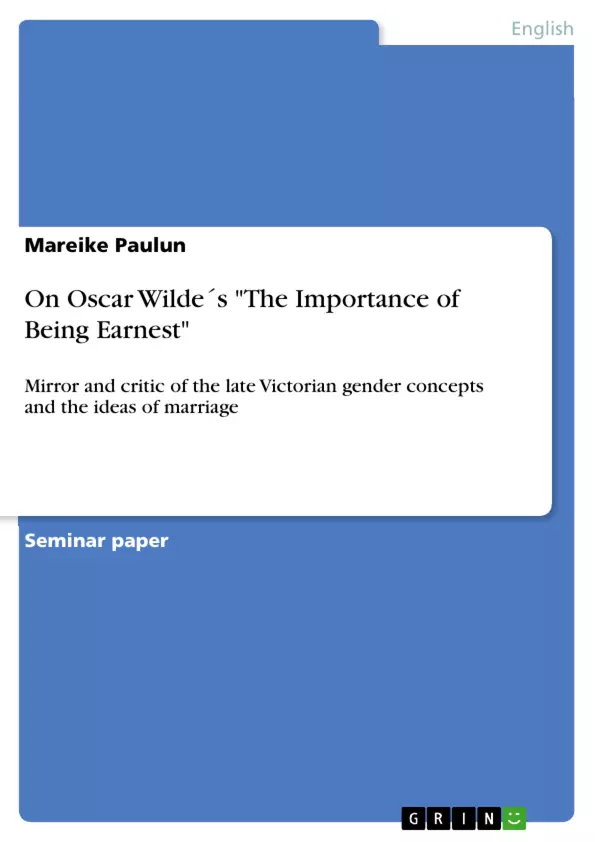This paper will identify certain types of characters of the upper-class and relate them to the developments of the gender role in the Victorian era. Going along with it the men´s different attitudes towards marriage as a constantly present issue in the play will be illustrated and compared to the points of view that dominated the high society in that time. Wilde refers to many more social habits and temporary fashions which however shall not be part of this paper.
Inhaltsverzeichnis (Table of Contents)
- Introduction
- Victorian concepts of womanhood and the counterparts in Wilde's play
- Historical background and change of concepts
- Cecily
- Gwendolen
- Appearance and reality of marriage
- Victorian concept of marriage
- Algernon's view of marriage
- Jack's view of marriage
- Lady Bracknell's view of marriage
- Conclusion
Zielsetzung und Themenschwerpunkte (Objectives and Key Themes)
This paper analyzes Oscar Wilde's play The Importance of Being Earnest as a reflection and critique of late Victorian gender concepts and ideas surrounding marriage. The paper aims to connect the characters and their perspectives on these topics with the prevailing social norms and evolving understandings of gender roles during that period.
- Victorian gender roles and their evolution
- The portrayal of women in the play and their conformity to or deviation from traditional concepts of femininity
- The different perspectives on marriage presented by the characters
- The use of humor and exaggeration to critique societal norms
- The play as a commentary on the upper class and its conventions
Zusammenfassung der Kapitel (Chapter Summaries)
The introduction provides context for the play, situating it within the broader trends of Victorian literature and its focus on social issues, particularly those related to gender and marriage.
The first section delves into Victorian concepts of womanhood, contrasting traditional views with evolving ideas and their representations in Wilde's play. It examines the historical background and explores the character of Cecily, highlighting her portrayal as an idealized Victorian woman who embodies the "Angel in the House" archetype.
The second section focuses on the portrayal of marriage in the play, comparing Victorian attitudes toward marriage with the perspectives expressed by characters like Algernon, Jack, and Lady Bracknell. This section analyzes how Wilde uses humor and satire to critique societal norms and expectations surrounding marriage.
Schlüsselwörter (Keywords)
The paper examines the Victorian era, gender roles, marriage, comedy of manners, Oscar Wilde, The Importance of Being Earnest, social critique, upper class, and Victorian society.
Frequently Asked Questions
How does Oscar Wilde critique Victorian society in this play?
Wilde uses satire, humor, and exaggeration to mock the rigid social conventions, superficiality, and hypocritical morals of the Victorian upper class.
What were the Victorian gender roles for women?
Traditional Victorian concepts often centered on the "Angel in the House" archetype—women were expected to be pure, domestic, and submissive to their husbands.
How do Cecily and Gwendolen represent or deviate from Victorian norms?
While they may appear to conform to ideals of femininity, their assertive behavior and obsession with the name "Ernest" satirize the triviality of social requirements.
What are the different views on marriage in the play?
Algernon views marriage as a business or a bore, Jack sees it as a romantic goal, and Lady Bracknell treats it strictly as a tool for social and financial advancement.
What is the significance of "Earnestness" in the play?
The title is a pun; "Earnest" refers both to the name and the Victorian virtue of being serious and sincere, which Wilde shows to be entirely absent in his characters.
Who is Lady Bracknell in the context of Victorian society?
She represents the ultimate guardian of Victorian social standards, prioritizing wealth, lineage, and propriety over genuine human emotion.
- Quote paper
- Mareike Paulun (Author), 2011, On Oscar Wilde´s "The Importance of Being Earnest", Munich, GRIN Verlag, https://www.grin.com/document/179328



